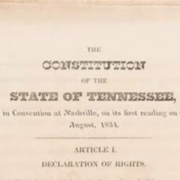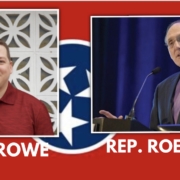Tennessee’s Constitution, 1840 TN Supreme Court Decision Show 2A Not Unlimited
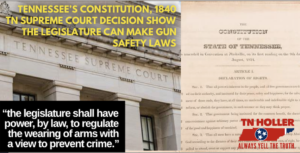
In August, Governor Lee is exercising his constitutional right to call for Tennessee’s legislature to come together in Nashville for an “extraordinary” session on “public safety” in the wake of the tragic attack at the Covenant School down the road that took the lives of innocent people, including children.
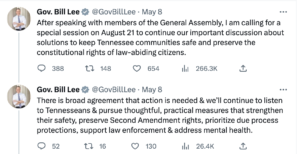
Lee’s press release about the special session did not include the word “guns”, but many are hopeful the discussion will revolve around some version of common sense gun reform, which even Fox News polls show are supported by the overwhelming majority of the people.
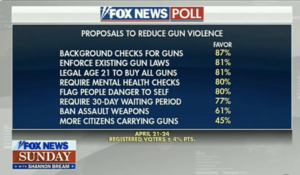
Predictably, pro-gun groups are already attacking Governor Lee for the implication that he will support some sort of “Extreme Risk Protection Order” that seeks to keep guns from dangerous people, saying he is betraying their constitutional rights as outlined by the 2nd Amendment. But 19 states already have these laws, including Florida which passed theirs after Parkland, and thus far they have withstood legal challenges.
The questions at the center of this special session will likely be a familiar one, one which we have been debating for many years: How unlimited is the 2nd Amendment really, and what was its true intention? To answer these questions about our nation’s constitution, our state’s constitution, and our Supreme Court’s interpretation of it, may provide the answers.
First, let’s remember what the 2nd Amendment actually says:
“A well regulated Militia, being necessary to the security of a free State, the right of the people to keep and bear Arms, shall not be infringed.”
2nd Amendment absolutists focus on that last part: “Shall not be infringed”, and say that overwrites the rest of it, even though it begins with “well regulated“, which those in favor of common sense gun reforms say would allow lawmakers to place limitations on the owning and carrying of weapons.
Even conservative Justice Scalia interpreted this right as not unlimited.
Former Tennessee House Republican Rep. Brandon Ogles highlighted the “well-regulated” part in committee, drawing ire from his own party.
FLASHBACK: “The 3rd word of the 2nd Amendment is well ‘REGULATED’ — and it ALWAYS HAS BEEN.”
Brandon Ogles (a Franklin REPUBLICAN
) cited the oft-ignored part of the 2A in opposition to @RepChrisTodd’s bill to lower the carrying age to 18 #HowManyMore pic.twitter.com/j0fC9Alj2H
— The Tennessee Holler (@TheTNHoller) May 29, 2022
Another key word to notice there is “Militia”, which many believe means the 2nd Amendment was actually the framers way of making sure the public was able to take up arms against a tyrannical government should the need arise, and not them saying everyone should be walking around armed to the teeth.
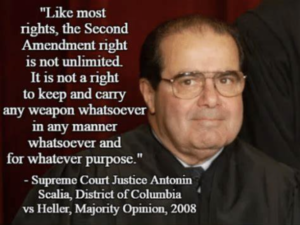
Standing here in the year 2023, over 200 years removed from the writing of the constitution, it’s hard to know exactly what they meant. But you know who was a lot closer to it, and in a much better position to understand the intentions of the United States constitution than we are?
The framers of our own Tennessee state constitution.
Article 1, Section 26 of the constitution can provide some clues as to which reading of the 2nd Amendment is closer to the framers’ intentions. It states:
“That the citizens of this state have a right to keep and to bear arms for their common defense; but the Legislature shall have power, by law, to regulate the wearing of arms with a view to prevent crime.”
Did you catch that 2nd part? Again: “The legislature shall have power, by law, to regulate the wearing of arms to prevent crime.”
The first constitution of our state was adopted in 1796, meaning those who wrote it were contemporaries of the framers of our nation’s constitution, and likely had a pretty good idea of what they meant.
So if they believe the legislature can regulate guns, how can we stand here 227 years later and say they can’t? That seems to be a highly unreasonable position to take.
It’s also worth noting that when Governor Lee and others say that we can’t regulate guns because criminals don’t obey the law, as he said to us after Uvalde, he is speaking in direct opposition to the very words in the state constitution he has sworn to uphold.
FLASHBACK: “Why does anyone need an AR-15, Governor? Why is this an American problem? Why do you care more about guns than kids?” @GovBillLee didn’t call on @Kanew so he yelled Q’s as Lee ran
(no word on a presser about the Covenant tragedy
)pic.twitter.com/I8yqr3bICn
— The Tennessee Holler (@TheTNHoller) March 28, 2023
Now let’s focus on the first part. Just like in the 2nd Amendment of the United States Constitution, which very clearly says it’s talking about a “Militia”, the Tennessee Constitution’s provision says “for their common defense”. What did they mean by that?
Again, here in 2023 it’s hard to say. But we can draw our answer from the Tennessee Supreme Court in 1840, which was asked to interpret this as it weighed in on a case involving a man who had been arrested for carrying a bowie knife in “Aymette V. State”.
The decision upheld the case against Aymette, who was arguing that Article 1, Section 26 allowed him to carry a bowie knife. In the ruling the Supreme Court made it clear that although he was “insisting” the law “gives every (white, at the time) man the right to arm himself in any manner however dangerous or unusual the weapon” – it went on to say the law did not do that.
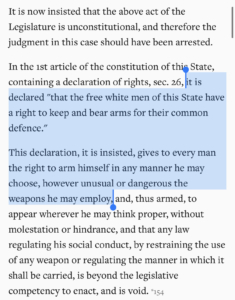
Instead, the ruling makes it clear it the Supreme Court believes the phrase “common defense” is key to understanding the law, in that it was really intended to make sure the public could defend itself against a tyrannical government should the need arise again, and that it did not mean individuals could walk around with weapons “efficient only in the hands of the robber and the assassin”, because “these weapons would be useless in war, could not be employed advantageously in common defense.
“The right to keep and bear them is not, therefore, secured by the constitution.”
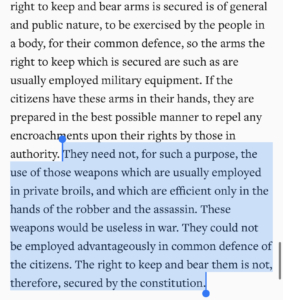
The ruling goes on to again say that the words “bear arms” are a specific reference to their military use – again useful for our understanding of the 2nd amendment itself – “and were not employed to mean wearing them about the person as part of the dress”.
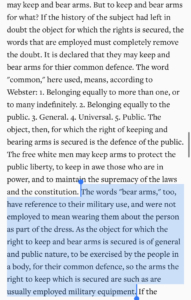
Not only does the Supreme Court say the legislature can make laws with regard to weapons, it goes so far as to call it “absurd” to think they would not be able to do so, and that the right to weapons in situations of “common defense” would be extended weapons in non-military situations, knowing that “in the hands of an assassin, they might take away life.”
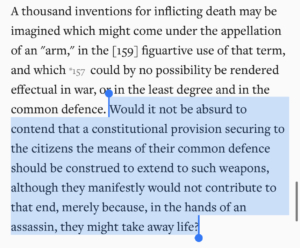
So yes, the Tennessee Supreme Court goes on to say, the Legislature has a right to “prohibit the wearing or keeping weapons dangerous to the peace and safety of the citizens, which are not used in civilized warfare, or would not contribute to to the common defense.
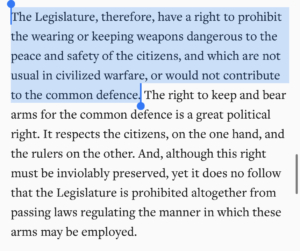
Addressing the argument that the Legislature cannot make these laws, the Supreme Court says it would be to “pervert a great political right to the worst of purposes, and make it a “social evil of infinitely greater extent than abandoning the right itself entirely.”
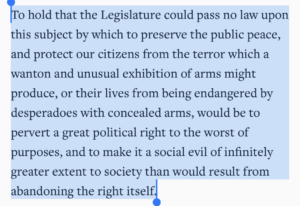
They go on to imagine “ruffians” entering a “theater” or “church” to the “terror of the audience”, saying it could become “habitual” – which, of course, it has – and say that it would “surely not” be beyond the power of the Legislature to pass laws to stop these horrors.
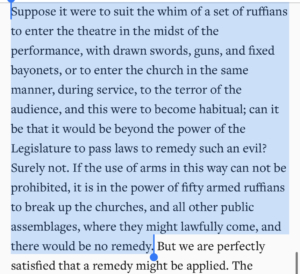
Prescient, no?
In summation, the Tennessee Supreme Court declares “the right to bear arms is not of that unqualified character” – meaning not without limitations – again reiterating that the law’s intention was of a “common defense” or military nature.
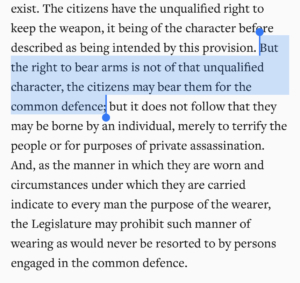
It’s worth noting that the argument of 2nd Amendment absolutists is often that even if it is in reference to a “militia” or the “common defense”, that that includes all citizens. But if they’re going to concede the 2nd Amendment is in reference to the “militia”, that word in the United States constitution is preceded by “well-regulated”.
They cannot have it both ways.
Again, the framers of the Tennessee constitution were alive in 1796. They were contemporaries of the men who wrote the United States constitution itself. Article 1 Section 26 very clearly gives the Legislature the power to make laws limiting the right to carry and keep weapons, and the Tennessee Supreme Court upheld that power in 1840 in Aymette V. State.
Today’s legislators cannot hide behind the constitution. They DO have the power to change our gun laws to keep us and our children safe.
The August special session will be here soon, called by their own Republican governor. It is way past time for them to do it.

